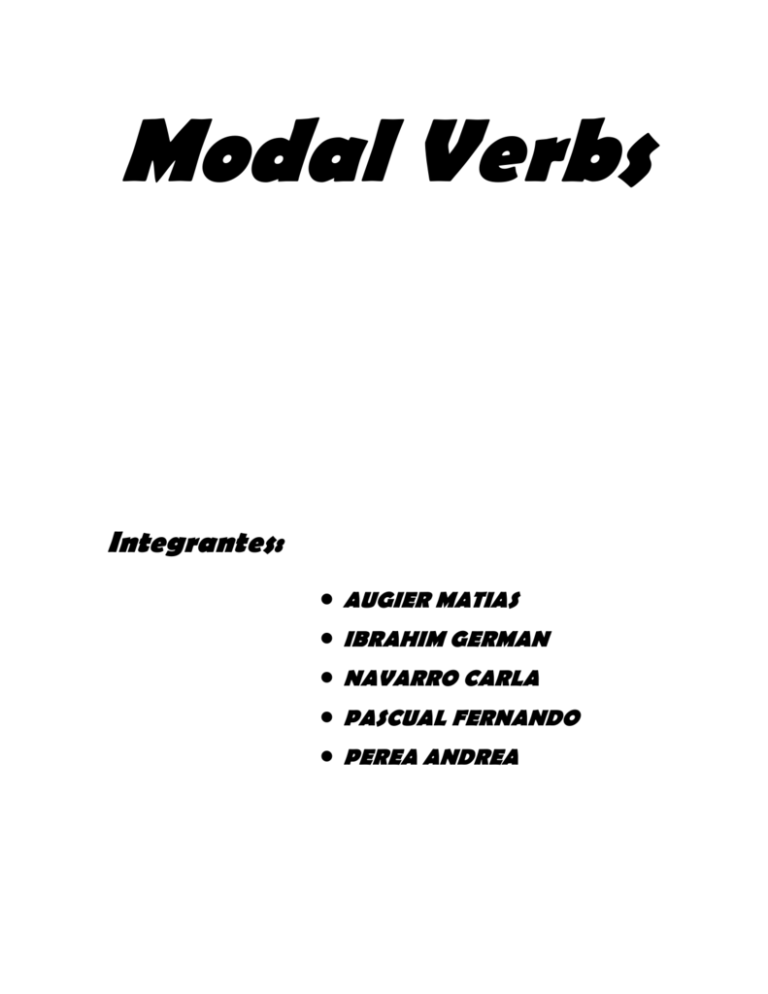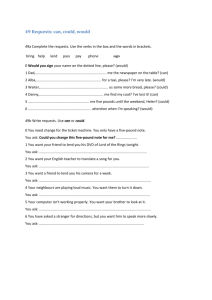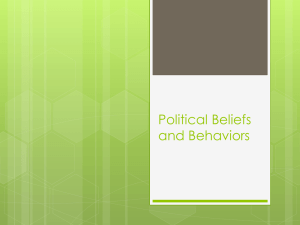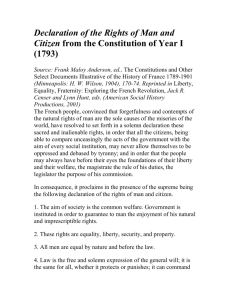Modal Verbs Integrantes: AUGIER MATIAS IBRAHIM GERMAN
advertisement

Modal Verbs Integrantes: AUGIER MATIAS IBRAHIM GERMAN NAVARRO CARLA PASCUAL FERNANDO PEREA ANDREA WHAT ARE MODAL VERBS? All the auxiliary verbs except be, do and have are called modals. Unlike other auxiliary verbs modals only exist in their helping form; they cannot act alone as the main verb in a sentence. Be, do, and have also differ from the other auxiliaries in that they can also serve as ordinary verbs in a given sentence. The modal verbs are:CAN / COULD / MAY / MIGHT / MUST / SHALL / SHOULD / OUGHT TO / WILL / WOULD Modal Example Uses Can They can control their own budgets. Ability / Possibility We can’t fix it. Inability / Impossibility Can I smoke here? Asking for permission Can you help me? Request Could I borrow your dictionary? Asking for permission. Could you say it again more slowly? Request We could try to fix it ourselves. Suggestion I think we could have another Gulf War. Future possibility He gave up his old job so he could work for us. Ability in the past May I have another cup of coffee? Asking for permission Could May China may become a major economic power. Future possibility Might We'd better phone tomorrow, they might be Present possibility eating their dinner now. Future possibility They might give us a 10% discount. Must We must say good-bye now. Necessity / Obligation They mustn’t disrupt the work more than necessary. Prohibition Ought to We ought to employ a professional writer. Saying what’s right or correct Shall Offer Shall I help you with your luggage? Shall we say 2.30 then? (More common Shall I do that or will you? in the UK than the US) Suggestion Should Saying what’s right or correct We should sort out this problem at once. I think we should check everything again. Profits should increase next year. Asking what to do Recommending action Uncertain prediction Will I can’t see any taxis so I’ll walk. Instant decisions I'll do that for you if you like. Offer I’ll get back to you first thing on Monday. Promise Profits will increase next year. Certain prediction Would Would you mind if I brought a colleague with Asking for permission me? Request Would you pass the salt please? Request Would you mind waiting a moment? Making arrangements "Would three o`clock suit you?" - "That’d be Invitation fine." Would you like to play golf this Friday? Preferences "Would you prefer tea or coffee?" - "I’d like tea please." Next, We will talk about the modal verbs “ought to” and “should” "Ought to" vs. "Should."? Palmer (The English Verb) distinguishes three uses of should. 1. to lay a tentative obligation You should come to the party tomorrow. 2. to express a probability They should be at their destination by now. 3. 'evaluative' should It's strange that he should say such a thing. He makes the following observations: In the first meaning, ought to and should are completely interchangeable: You ought to come to the party tomorrow. In the second, ought to is theoretically possible, but is rarely used with this meaning. They ought to be at their destination by now. In the third, ought to is not used. * It's strange that he ought to say such a thing. By telling "ought to" you suggest someone what is one of the last options one has or something that one can't easily avoid, for example, any longer. By telling "should" you suggest someone that something is good to be done or something that after all is meaningful. The difference is in importance you give when you say "ought to" or "should". "Ought to" wants to say that you think that it is more important something to be done. As well, "should" more expresses something than it is explicit. "Ought to" is more explicit, closer to a request than "should". The difference between "ought to" and "should", when they mean "giving a suggestion", is better understood when you examine expressions and examples. For example if I like a cake very much and I want to suggest someone to try it I would say: "You ought to try this cake." In this case if we use "You should try this cake", it says not much about how strong I liked it. If someone is leaving the house after the diner, a polite way to invite him again is "You ought to visit us again." In this case if we use "You should visit us again", it does not give that strong expectation. With "you ought to visit us again" you compliment to the person that has visited you far more than with "you should visit us again". "ought to" is sometimes a synonym to "cannot avoid". "should" is almost never a synonym to "cannot avoid". "That ought to be easy." expresses the expectations that might not be true. For example, you tried to solve a problem, but it just doesn't go the way you want. "That should be easy" contains far less negative feelings. (In this case "That ought to be easy." is almost equal to "That should've been easy") With correct usage, both "should" and "ought to" have their very precise places in modern English. What makes confusion is that people are using them carelessly, as is the case with other expressions or verbs in English. With "ought to" instead of "should", you can make your thought more precise, but you can as well make someone puzzled why you have used "ought to" at all. If someone cannot feel the difference between "ought to" and "should", it is safe to always use "should". Actually, people or learner of English tend to do El verbo 'ought to' es igual al 'should' y expresa una obligación débil. Significa debería, tendría so, thus it looks that "ought to" is rare. It is not rare, it only has a more specific que. usage than "should". I ought to - debería / tendría que "Ought to" almost always holds a strong warning about the consequences, or emphasizes good features of consequences if it is something positive. Affirmative Helen ought to be more careful. Helen debería tener más cuidado. I ought to stay in bed. Yo debería quedarme en la cama. We ought to go together. Deberíamos ir juntos. They ought to be here already. Ellos ya deberían estar aquí. You ought to eat more vegetables. Deberías comer más vegetales. Tom ought to take her home. Tom debería llevarla a casa. It ought to work properly. (Esto) Debería funcionar correctamente. Negative You ought not to drink so much. No deberías beber tanto. They ought not to go camping without a torch. Ellos no deberían ir de camping sin una linterna. George ought not to wear someone else's glasses. George no debería usar los anteojos de otra persona. Interrogative Ought Rachel to be here so early? ¿Debería Rachel estar aquí tan temprano? Ought they to live there? ¿Deberían ellos vivir allí? Ought to + have You ought to have read the book for today. Deberían haber leído el libro para hoy. They ought to have gone to the supermarket. Ellos deberían haber ido al supermercado. We ought to have listened to the guard. Deberíamos haber escuchado al guardia. Ought To "Ought to" is used to advise or make recommendations. "Ought to" also expresses assumption or expectation as well as strong probability, often with the idea that something is deserved. "Ought not" (without "to") is used to advise against doing something, although Americans prefer the less formal forms "should not" or "had better not." Examples: You ought to stop smoking. recommendation Jim ought to get the promotion. It is expected because he deserves it. This stock ought to increase in value. probability Mark ought not drink so much. advice against something (notice there is no "to") Using "Ought to" in Present, Past, and Future Most modal verbs behave quite irregularly in the past and the future. Study the chart below to learn how "ought to" behaves in different contexts. Modal Use ought to recommendation, advice Positive Forms 1. = Present 2. = Past 3. = Future Negative Forms 1. = Present 2. = Past 3. = Future 1. Margaret ought to exercise more. 1. Margaret ought not exercise too much. It might cause injury. 2. Margaret ought to have exercised more so she would be better prepared for the marathon. 3. Margaret ought to come to the fitness center with us tonight. 2. Margaret ought not have run the marathon. She wasn't in good shape. You can also use: should 3. Margaret ought not stay at home in front of the TV. She should go to the fitness center with us. 1. She ought to have the package by now. ought to assumption, expectation, probability 2. She ought to have received the package yesterday. 3. She ought to receive the package tonight. "Ought not" is used primarily to express negative recommendations. (See above.) should Should "Should" is most commonly used to make recommendations or give advice. It can also be used to express obligation as well as expectation. Examples: When you go to Berlin, you should visit the palaces in Potsdam. recommendation You should focus more on your family and less on work. advice I really should be in the office by 7:00 AM. obligation By now, they should already be in Dubai. expectation Using "Should" in Present, Past, and Future Most modal verbs behave quite irregularly in the past and the future. Study the chart below to learn how "should" behaves in different contexts. Modal Use Positive Forms 1. = Present 2. = Past 3. = Future Negative Forms 1. = Present 2. = Past 3. = Future You can also use: 1. Sarah shouldn't smoke so much. It's not good for her health. 1. People with high cholesterol should eat low-fat foods. should recommendation, advisability 2. Frank should have eaten lowfat foods. That might have prevented his heart attack. 3. You really should start eating better. should obligation I should be at work before 9:00. 2. Sarah shouldn't have smoked so much. That's what caused her health problems. ought to 3. Sarah shouldn't smoke when she visits Martha next week. Martha hates when people smoke in her house. NO NEGATIVE FORMS be supposed to We should return the video before the video rental store closes. "Should" can also express something between recommendation and obligation. "Be supposed to" expresses a similar idea and can easily be used in the past or in negative forms. 1. Susan should be in New York by now. should expectation 2. Susan should have arrived in New York last week. Let's call her and see what she is up to. 3. Susan should be in New York by next week. Her new job starts on Monday. 1. Susan shouldn't be in New York yet. 2. Susan shouldn't have arrived in New York until yesterday. 3. Susan shouldn't arrive in New York until next week. ought to, be supposed to








